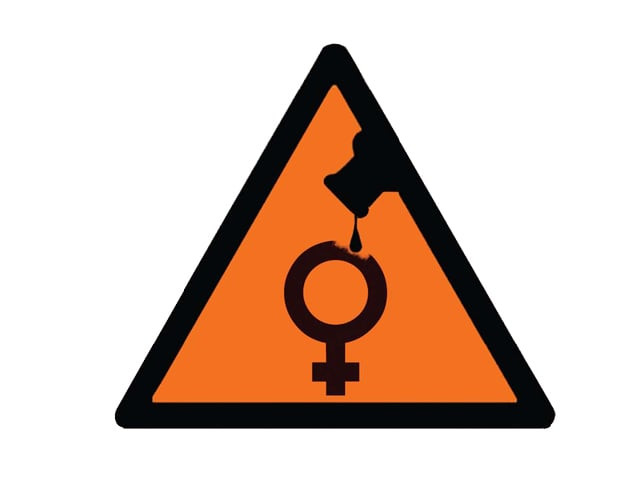Missing evidence: Acid attack victim’s mother seeks justice
An FIR was registered for attempted suicide, despite daughter’s video statement implicating in-laws.

Tahira’s parents are too poor to pursue the case, so non-governmental organizations are presently financing the case. PHOTO: FILE
The mother of a woman allegedly killed by her husband and in-laws in Mangar Kot village, Malam Jabba, has sought justice from the government for her daughter, whose death is being treated as a suicide.
Bano, 22-year-old Tahira’s mother has accused her daughter’s in-laws of throwing acid on her daughter. Tahira told me that her husband Saba Khan grabbed her and her mother-in-law and sister-in-law threw acid on her last March, while she was admitted in hospital.
Tahira was then shut in a room for 14 days, despite severe burn injuries on her body. Her in-laws used herbal medicines for treatment but when neighbours were alerted by her constant screams, they were forced to take her to the Saidu Sharif Teaching Hospital.
“We came to know about our daughter’s fate three weeks later when I was with my daughter-in-law in the hospital.” Someone came to me saying that a burnt girl has been brought from Mangar Kot village, she said. When I went to see her it was my daughter. “Observing her critical condition we shifted her to Peshawar.”
When we went to the Malam Jabba police station to register an FIR, the police mocked us for reporting the incident 20 days later, Bano said. The police registered an FIR under Article 316 as an attempted suicide,” she told The Express Tribune.

Bano accused her daughter’s in-laws of dousing her daughter in acid and said when Tahira succumbed to injuries neither her husband nor her in-laws came for condolence which proved that they were guilty. “We only want justice for our daughter,” she said, requesting the Chief Justice and Prime Minister of Pakistan to take notice of the case.
When Malam Jabba police SHO Ahmad Khan was contacted for his version, he said an FIR of attempted suicide had been registered. Similarly Saba also claimed that his wife had committed suicide. They refused to say more about the matter.
From the post mortem report it was learnt that the doctors could not identify whether the wounds were caused by acid or fire because of the herbal medicines applied on the wound by her in-laws.
In an interview Tahira gave to a local television channel just before her death, she accused her husband and in-laws that of throwing some fluid on her body which burnt her, however, the investigation officer of the case did not include it deliberately in the investigation file.
“The most important thing in the case is Tahira’s dying video statement. Under Article 164 of the 1984 Qanoon-e-Shahadat, any modern device is admissible for recording testimony. If Tahira’s video statement is included, the case will take a new turn,” said Saima Anwar a district court lawyer, adding that the police must include the video statement in the investigation report.
The case is being heard in the district courts. But according to the victim’s lawyer, Sohail Sultan, the case has been weakened as the police did not include the key evidence-the video recording in which the victim has recorded her statement. “The statement under Article 46 of the Qanoon-e-Shahdat 1984 is sufficient to indict the accused so we demand that the police include it in the investigation file,” he said.
Tahira’s parents are too poor to pursue the case, so non-governmental organisations, the Awakening and Da Khwendo Tolana, a sister group, are presently financing the case.
Published in The Express Tribune, February 24th, 2013.



















COMMENTS
Comments are moderated and generally will be posted if they are on-topic and not abusive.
For more information, please see our Comments FAQ